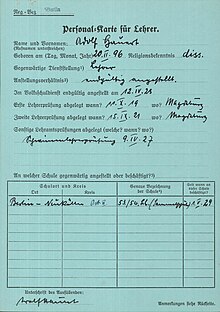Adolf Hauert
Adolf Hauert (born February 20, 1896 in Fermersleben ; † October 9, 1988 ) was a German writer and educator.
Life
Hauert trained as a teacher and became a school councilor. He took his first teacher examination on October 11, 1919, and his second examination on September 15, 1921 in Magdeburg . Since April 12, 1923 he was permanently employed in the public school service. From May 1, 1929 he was on the 53rd/54. Active primary school in Berlin-Neukölln .
Until 1930 Hauert acted as editor of the journal Die Freie Schule . From 1929 to 1933 he also worked as a lecturer for the independent school publishing house in Berlin. Hauert also published on educational issues in the social democratic Volksstimme , which appeared in Magdeburg .
He later lived in Rotenburg an der Fulda and was one of the founders of the adult education center here after 1945 . In addition, he was a founding member of the Rotenburg home and tourist association.
He wrote several volumes of poetry, children's books and plays and worked as a local poet in the Hersfeld-Rotenburg district .
In 1936, the German teacher newspaper recommended, among other things, the use of a work written by Hauert, People and Fatherland, as a speaking choir in National Socialist classes. His 1935 works The gray ditch. Front experiences in stories, chants and songs. and The Hike to the Holy Fire, a boy story from the year of change in 1933. were placed on the list of literature to be sorted out in 1946 by the German Administration for National Education in the Soviet occupation zone .
Works
- Blooming poppies , prose and verse, 1918
- Couer-Ass , 1919
- The visual arts experience in school , 1922
- Into life. A Book for the Graduation Ceremony , 1926 (as editor)
- We are close. A Christmas play , 1927
- Flowers bloom black and red. A youth game with a small speaking choir for the graduation party or youth consecration , 1930
- There is a call going through the country , chorus play, 1931
- The hike to the holy fire. A youth story from the year of change in 1933 , 1935
- The gray trench. Front experiences in stories, chants and songs , 1935
- The old couple. Hupstlitz. The Forgotten Treasure , Three Fairy Tales, 1947
- Kinderland, a holistic primer , 1961 (editor, collaboration with H. Becker)
- The birthday box , children's book, 1961
- Simsalabim and Simsalabum , children's book 1961
- Glücki. A story from the world of children , 1963
- Colorful leaves , poems, 1972
- The baby attack. A game from Hessen , 1976
- What women choose. A funny swank , 1977
- Your oil sheik. Modern social comedy , 1978
- Rebellion against Napoleon. Historical farce , 1979
- Princess Clotilde and King "Lustic", Little Hessian Homeland Comedy , 1980
- A Landgrave and a Knot Stick, Small Hessian Homeland Comedy , 1982
- Waldhessen calls , poems, 1984
- A lifetime of love , poetry, 1985
- In the carousel of life , poems, 1987
literature
- Konrad Feilchenfeldt , German Literature Lexicon, The 20th Century / Halm-Hauptmann: Volume 14 , De Gruyter 2010, ISBN 978-3110231601 , column 490 f.
Web links
Individual evidence
- ↑ Information from the German National Library on the place of birth
- ↑ Information about the author in the book The old couple, Hupsflitz, The forgotten treasure , Verlag Zahnwetzer Kassel Sandershausen 1947
- ↑ The victory belongs to the secular school in the Volksstimme of May 24, 1931
- ↑ Olaf Glaudig, Peter Veit, Der Widerschein des Nazismus . The image of National Socialism in the German-language press of Argentina, Brazil and Chile 1932-1945 , wvb Wissenschaftlicher Verlag Berlin 1997, ISBN 978-3932089015 , page 430
| personal data | |
|---|---|
| SURNAME | Hauert, Adolf |
| BRIEF DESCRIPTION | German writer and educator |
| DATE OF BIRTH | February 20, 1896 |
| PLACE OF BIRTH | Fermersleben |
| DATE OF DEATH | October 9, 1988 |
